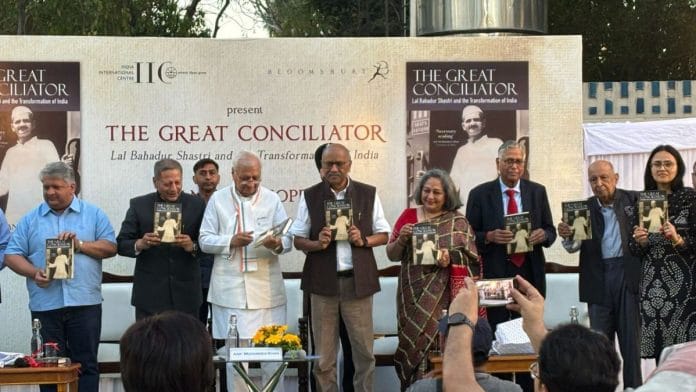New Delhi: When Lal Bahadur Shastri set out to meet General Ayub Khan in 1966, a journalist asked how he would negotiate peace with the formidable, 6-foot-2 Pakistani president. To this, the 5-foot-2 Shastri replied with his characteristic wit: “Main Ayub Khan se sar uthakar baat karunga aur vo sar jhuka kar baat karenge – I will talk to him with my head held high, and he will have to look down to talk to me.”
This defiant confidence defined Shastri’s 19-month tenure as India’s second Prime Minister. A transformative man who, according to former Lal Bahadur Shastri National Academy of Administration (LBSNAA) director Sanjeev Chopra, was sidelined by history.
“There were two lakh books in the (LBSNAA) library, but the books on Shastri ji were not more than 20—the very person after whom the academy was named. That was the contrast when compared to the books on Nehru and Indira Gandhi,” said Chopra, who decided to write The Great Conciliator: Lal Bahadur Shastri and the Transformation of India, after noticing this vacuum.
More than 600 people gathered to witness the launch of his book, published by Bloomsbury, at the India International Centre in New Delhi. Unveiled by Bihar governor Arif Mohammed Khan, the book launch was attended by his grandson Adarsh Shastri, ThePrint founder and Editor-in-Chief Shekhar Gupta, and historian Aishwarya Pandit, among other big names.
Lal Bahadur Shastri steered India through war, economic upheaval, and internal unrest—a quiet conciliator who turned into a resolute leader. After so many years and so many prime ministers, his legacy still sparks debate, admiration, and conspiracy theories. But as the discussions at this book launch proved, Shastri was not just a leader of his time—he was a leader for all times.
“Sometimes in the game of cricket, in a movie, what makes more impact is a cameo… Shastri ji, in a way, was a cameo. But one that changed the course of history,” said Shekhar Gupta.
A triumphant leader
Anecdotes from Lal Bahadur Shastri’s life filled the air at the event, packed with college students, civil servants, journalists to professors. Arif Mohammed Khan recalled a clever and humorous statement Shastri had made about Ayub Khan during the 1965 war with Pakistan, while delivering a speech at Delhi’s Ramlila Maidan.
“Sardar Ayub had announced that he would march to Delhi on foot, to which Shastri ji said: ‘Look at his stature; he is such a great, bulky man. Why should he have to walk all the way to Delhi? I should go to Lahore and welcome him instead,’” said Khan as the audience broke out in laughter and applause.
Even in the face of aggression, Shastri remained composed, witty, and dignified, leading India through some of the most tumultuous years in its history.
“People don’t remember what the ’60s were like. It was India’s most dangerous decade—separatist movements in the South, Punjab, and the Northeast, an Army still recovering from 1962, and a hostile neighbour waiting to strike. In just 19 months, Shastri ji not only held the country together but also gave it the confidence to fight back. His tenure was a short, match-winning cameo—like Hardik Pandya walking in and hitting four sixes to turn a game,” said Shekhar Gupta.
Shastri’s leadership during the 1965 war boosted India’s military confidence. Even though Pakistan had technological superiority, India pushed it back and reached Lahore’s very doorstep. But the PM’s greatest test came after the war—negotiating peace at Tashkent.
“Shastri ji, a leader who knew when to fight, also knew when to seek peace. Tashkent was a triumph, but instead of being celebrated, he was criticised. Even today, WhatsApp conspiracy theories won’t let Tashkent rest,” said Gupta.
(Edited by Zoya Bhatti)






